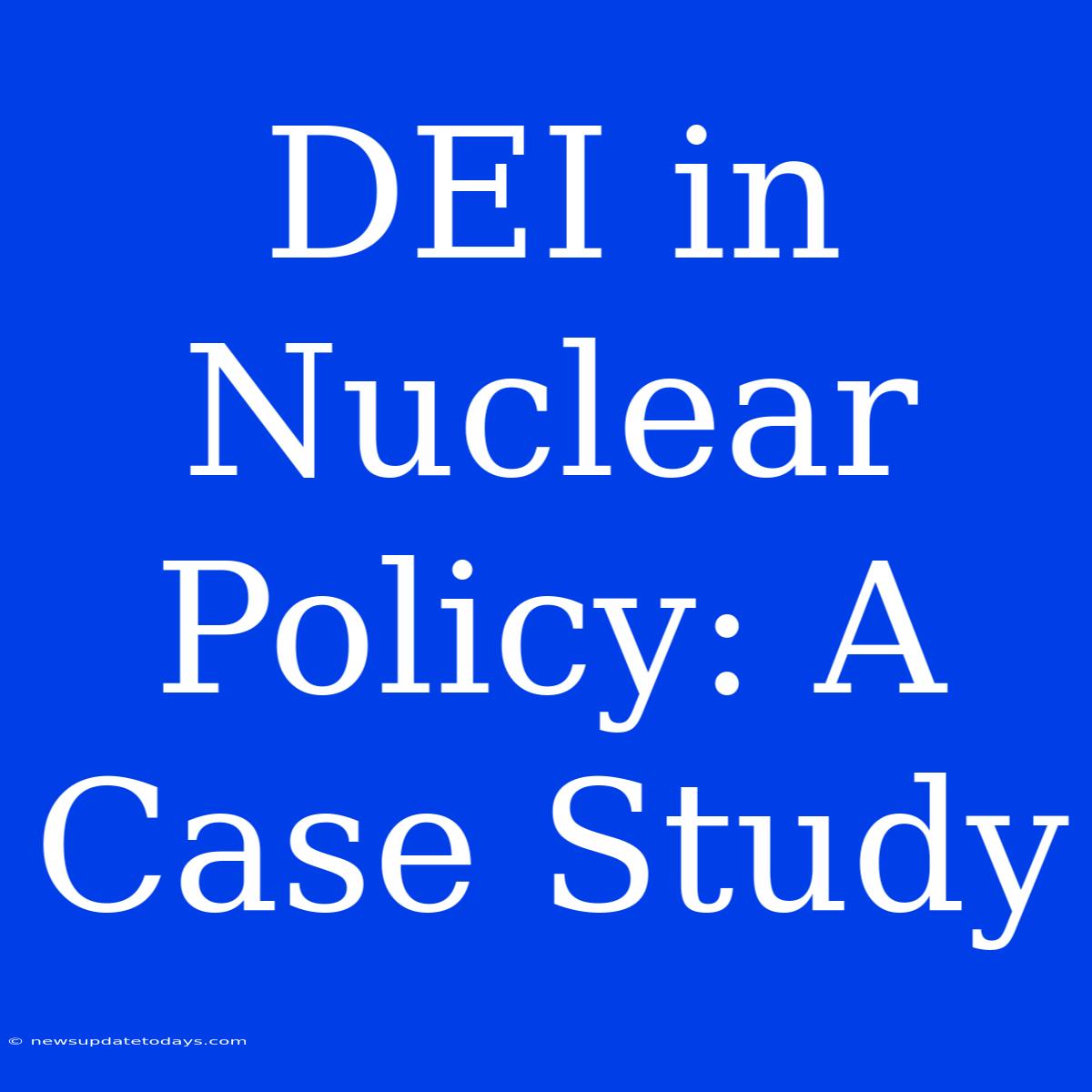DEI in Nuclear Policy: A Case Study – Unlocking Equitable and Inclusive Approaches to Nuclear Security
Diversity, Equity, and Inclusion (DEI) are increasingly recognized as crucial elements in effective governance and policy-making across all sectors. The nuclear field, historically characterized by a homogenous workforce and decision-making structure, is no exception. This article examines the critical need for DEI in nuclear policy, using a case study approach to illuminate its benefits and challenges. We will explore how a lack of diversity can lead to flawed policy decisions and propose strategies for fostering a more inclusive and equitable nuclear landscape.
Why DEI Matters in Nuclear Policy
Nuclear policy, concerning the development, use, and control of nuclear weapons and technology, has global ramifications. Decisions made within this field carry immense consequences, affecting international security, environmental protection, and public health. The absence of diverse voices and perspectives within this decision-making process significantly limits the effectiveness and legitimacy of nuclear policy.
Here's why DEI is paramount:
-
Improved Policy Outcomes: A diverse workforce brings a wider range of experiences, perspectives, and expertise to bear on policy challenges. This leads to more nuanced understandings of complex issues, fostering more effective and equitable solutions. For instance, integrating perspectives from communities potentially impacted by nuclear activities can lead to policies that better address their concerns and mitigate risks.
-
Enhanced Risk Assessment: A diverse team is better equipped to identify and assess potential risks associated with nuclear policy. Different backgrounds and life experiences can highlight blind spots and biases that may otherwise be missed, leading to more robust risk mitigation strategies.
-
Increased Public Trust and Transparency: When the nuclear policy-making process reflects the diversity of the population it affects, public trust and engagement are significantly enhanced. Inclusive decision-making processes foster greater transparency and accountability, promoting confidence in the legitimacy of nuclear policies.
-
Strengthened International Cooperation: DEI principles are crucial for fostering effective international cooperation on nuclear non-proliferation and disarmament. Recognizing and valuing diverse cultural norms and perspectives is essential for navigating complex geopolitical landscapes and building trust amongst nations.
Case Study: [Insert Specific Case Study Here]
(This section requires a specific case study. For example, you could analyze a particular country's nuclear policy-making process, a specific international nuclear agreement, or a particular incident related to nuclear technology. The case study should clearly illustrate the impacts of (or the lack of) DEI.)
For example, a case study might examine the lack of women in senior decision-making roles within a particular national nuclear agency and analyze how this underrepresentation might have affected the formulation of specific nuclear policies. Or it could analyze how a particular international treaty neglected the voices and concerns of specific regions or marginalized communities impacted by nuclear activities.
The case study should analyze:
- The current state of DEI within the chosen context.
- Specific examples of how a lack of DEI has impacted policy outcomes.
- The potential benefits of incorporating DEI principles.
- Challenges in implementing DEI strategies within the nuclear sector.
Strategies for Promoting DEI in Nuclear Policy
Implementing meaningful DEI in the nuclear field requires a multi-pronged approach. Key strategies include:
- Targeted recruitment and retention programs: Actively recruiting and retaining individuals from underrepresented groups in the nuclear sector.
- Mentorship and sponsorship initiatives: Providing support and guidance for individuals from underrepresented groups to advance their careers.
- Diversity training: Educating personnel on unconscious bias and cultural sensitivity.
- Inclusive policy-making processes: Establishing mechanisms for incorporating diverse perspectives into policy development and implementation.
- Community engagement: Actively engaging with communities potentially affected by nuclear activities.
Conclusion
DEI is not merely a matter of social justice; it is a critical requirement for effective and legitimate nuclear policy. By embracing DEI principles, the nuclear sector can enhance its decision-making processes, improve policy outcomes, and foster greater public trust. Adopting the strategies outlined above is crucial for building a safer, more equitable, and inclusive nuclear future. Further research and detailed case studies are needed to fully understand the complex interplay between DEI and nuclear policy, and to develop tailored interventions that promote lasting change.

